Finding my Wei
Dropping by a bookstore to pick up a copy of Tao Te Ching seemed liked a simple task. But like many simple things, this one held great complexity within. Over 2000 years old, it's been translated often—and each version is a little bit different.
I first read Tao Te Ching back in college and it really spoke to me, as any Eastern philosophy might to a college freshman double-majoring in Fine Art and Philosophy who grew up in smalltown Indiana with the only radio stations playing classic rock and "hot" country. The concept of action by inaction (wei wu wei) connected with my existing understanding of art at the time. As much could be said by the absence of a line as by its inclusion. It's been almost a decade since I've read it (having given my copy to my father during his "simplify my life" phase) and thought that I may have a different understanding of it now that I'm a smidge closer to Enlightenment.
Unfortunately, there were no fewer than 6 different translations at my local bookstore, all of them subtly different. I decided to pick a random passage (Tao 33) and compare them. Here's the first line from several of them (please forgive the poor quality of my cameraphone).
From John C.H. Wu's translation, Lao Tzu: Tao Te Ching:
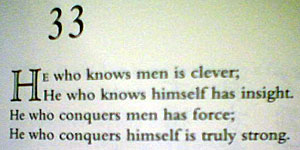
A good enough start. I put a copy aside and kept browsing.
Gia-Fu Feng's Tao Te Ching, 25th-Anniversary Edition:
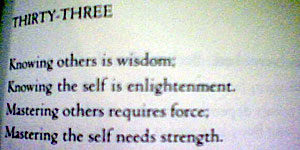
I'm not a huge fan of the "requires force/needs strength" here. It handles the parallelism between others and self a little clumsily, almost suggesting mastering others is as worthy as mastering oneself. Points for gender neutrality though.
Penguin Classics' translation, simply titled Tao Te Ching:
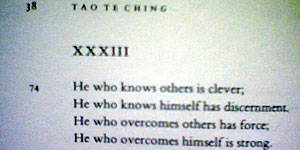
Roman numerals? Ick. The designer in me rejects them for being unsuited to the nature of the text, the reader in me doesn't want to have to decipher them everytime I look up a passage.
Wow, even Ursula K. LeGuin has a translation, Lao Tzu: Tao Te Ching: A Book About the Way and the Power of the Way:
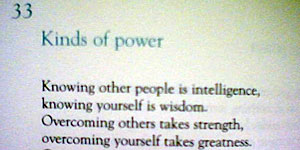
Uhm... What's with the title colon title colon title? Seems almost disrespectful. As do the quick summaries at the top of each passage. Maybe let the text stand on its own?
Stephen Mitchell's translation, Tao Te Ching: A New English Version, had a very pretty cover:
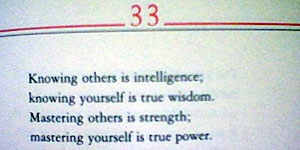
The book itself was a little big for my tastes and seemed a little over-designed. I was too soon distracted by this next one...
Jonathan Star's translation, Tao te Ching, had tiny writing saying "The Definitive Edition" (of which I was quite skeptical):
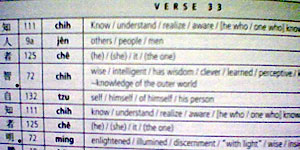
Wow. I don't know what to say. That certainly covers all the bases. Any questions I had about the variations in translations seem to be handled by this comprehensive, if overly clinical, approach.
In the end, I bought John C.H. Wu's translation. It was the cheapest and fit in my pocket. Plus, there's something vaguely Tao about its ability to transcend the other versions by just not doing anything wrong.